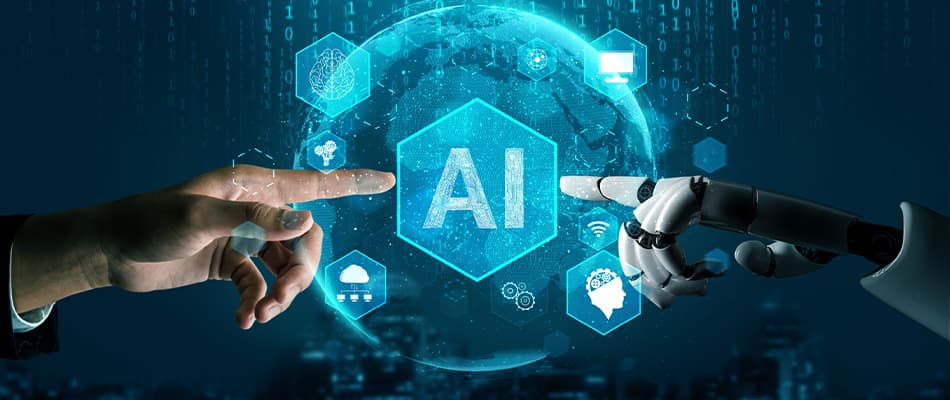Jobs of the Future: Artificial Intelligence
Artificial intelligence (AI) is no longer a distant concept from science fiction movies; it is quickly becoming a daily reality. From voice assistants like Siri and Alexa to self-driving cars and smart home devices, AI technology transforms how we live and work.
As AI continues to evolve and advance, it is not only changing the way we interact with technology, but it is also reshaping the job market. The emergence of AI is creating new opportunities for skilled professionals while posing challenges for specific industries.
In this article, let us explore the jobs of the future in an AI-driven world and examine how this technology is revolutionising various sectors.
Understanding the Impact of AI on Job Markets.
The rapid development of artificial intelligence (AI) technology is undoubtedly reshaping the job market as we know it. As AI continues to evolve, it is essential to understand its impact on different sectors and job roles.
One of the crucial domains that AI is revolutionising is automation. Companies across industries increasingly use AI-powered machines and algorithms to streamline processes and increase efficiency. As a result, specific jobs that involve repetitive tasks or data analysis are at risk of being automated. Roles such as data entry, manufacturing, and even some aspects of customer service may be replaced by AI systems.
However, it is crucial to note that AI is not solely a job threat. On the contrary, it opens up new opportunities and creates a demand for skilled professionals in various fields. Jobs requiring higher cognitive skills, creativity, and emotional intelligence, such as software development, data analysis, and customer experience management, will likely surge in demand.
Moreover, the emergence of AI is also creating new job roles that were previously non-existent. Ethical AI specialists, robotics engineers, and AI trainers are examples of positions becoming increasingly crucial as AI technology advances.
New Opportunities and Roles Created by Artificial Intelligence.
While the emergence of AI undoubtedly brings concerns about job displacement, it also presents many new opportunities and previously non-existent positions. As AI technology advances, the demand for professionals in specific fields is experiencing significant growth.
Ethical AI specialists
One promising area is the field of ethical AI. As AI systems become more integrated into our daily lives, ethical considerations surrounding their use and impact on society are becoming more critical. Ethical AI specialists play a vital role in ensuring that AI technology is developed and deployed ethically, addressing data privacy, algorithmic bias, and transparency.
Robotics Engineering
Another emerging field is robotics engineering. With the rise of AI, robots are increasingly being utilised in various industries to perform complex tasks. Robotics engineers are responsible for designing, building, and programming robots, ensuring they can perform their intended functions safely and efficiently.
Artificial Intelligence or AI trainers
AI trainers also have a critical role that is growing in demand. These professionals work with AI systems, training them to understand and respond to human input accurately. By fine-tuning algorithms and teaching AI systems how to interpret data, AI trainers play a significant role in improving the performance and capabilities of AI technology.
As AI continues to evolve, new opportunities will arise in various industries. Individuals must stay informed about these emerging roles and acquire the necessary skills to stay relevant in an AI-driven world.
Preparing for the Future: Upskilling and Reskilling.
As the job market evolves with the emergence of AI, it becomes increasingly important for individuals to stay ahead of the curve by acquiring the necessary skills to thrive in this new landscape.
Upskilling and reskilling are crucial for professionals to adapt to the changing demands of the job market.
Staying Informed:
Staying informed about the latest trends and advancements in AI technology is one of the best ways to prepare for the jobs of the future. This can be done by attending seminars, workshops, and industry conferences to understand AI’s potential and how it can be applied in different sectors.
Online Courses:
Individuals can take advantage of online courses and certifications that offer specialised training in AI-related fields. The artificial intelligence online courses provide an opportunity to learn the specific skills and knowledge needed in ethical AI, robotics engineering, and AI training.
Experiential learning:
Gaining hands-on experience is another effective way to prepare for the future. It can be acquired through internships or projects in AI-related fields. This practical experience allows individuals to apply their skills and provides valuable insights into the challenges and opportunities that AI presents.
Networking prospects:
Networking with professionals who are already working in AI-related roles can be beneficial. Engaging in industry-specific communities and attending networking events can help individuals uncover job opportunities, gain insights from experienced professionals, and build valuable connections.
By upskilling and reskilling, individuals can position themselves as valuable assets in an AI-driven world. The ability to adapt, learn, and embrace new technologies is essential for thriving in the jobs of the future.

Conclusion
As we conclude our discussion on the emergence of AI and its impact on the workforce, it is clear that our work is constantly evolving. AI technology presents both opportunities and challenges for professionals in various industries.
While feeling uncertain and apprehensive about introducing AI into our work environments is natural, it is crucial to remember that AI is not here to replace us. Instead, it enhances our skills and capabilities, allowing us to focus on more meaningful and strategic tasks.
To thrive in the age of AI, professionals must be ready to adapt and continuously upskill themselves. Acquiring knowledge and expertise in AI-related fields will be essential to effectively working alongside AI systems. This may involve understanding how AI algorithms work, learning to interpret and utilise AI-generated insights, and developing the ability to collaborate seamlessly with AI technology.
Thus, by embracing the opportunities presented by AI and investing in our professional growth, we can position ourselves as valuable assets in the evolving workforce. The future of work may be different, but with the right mindset and skills, we can navigate this new era and shape it to our advantage.
The emergence of Artificial Intelligence brings both excitement and uncertainty. However, by embracing AI as a tool rather than a threat, professionals can tap into its potential to enhance productivity, streamline processes, and drive innovation. With a willingness to adapt and upskill, professionals can thrive in the age of AI and contribute to a future where humans and AI systems work together harmoniously.
So, whether you’re looking to kickstart a career in AI, upskill in your current role, or satisfy your curiosity, you’ll find a course that fits your needs. So go ahead, explore the vast world of AI courses, and embark on a journey to become an AI expert with Digital Regenesys!
Click here to explore Digital Regenesys’ Artificial Intelligence Course, online artificial intelligence courses, artificial intelligence course syllabus and more.
FAQs – Frequently Asked Questions: Jobs of the Future: Artificial Intelligence.
What is Artificial Intelligence (AI), and how is it shaping the job market?
Answer: AI refers to developing computer systems that can perform tasks that require human intelligence. It shapes the job market by creating new roles, automating routine tasks, and driving innovation across industries.
How does AI impact traditional industries, and what opportunities does it create for job seekers?
Answer: AI is automating routine tasks, enhancing efficiency, and creating opportunities for innovation. Job seekers can explore AI-related roles in healthcare, finance, manufacturing, and more.
What are some vital AI-related job roles emerging in the job market?
Answer: Emerging job roles include: AI Ethicist, Data Scientist, Robotics Engineer, AI/ML (Machine Learning) Engineer and Natural Language Processing (NLP) Engineer, among others.
What skills are essential for a career in AI, and how can individuals acquire them?
Answer: Essential skills include: Programming, Data analysis, Machine learning, Problem-solving, and Domain-specific knowledge. Individuals can acquire these skills through formal education, online courses, and practical hands-on experience.
Are there educational prerequisites for pursuing a career in AI?
Answer: While specific educational backgrounds vary, a strong foundation in computer science, mathematics, or related fields is often beneficial. Many professionals in AI roles have advanced degrees, but practical experience and skills are equally important.














